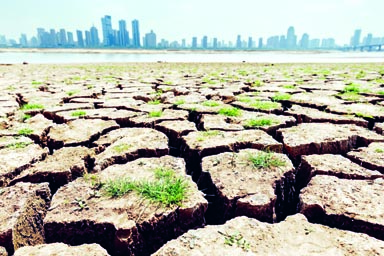DE Online Desk
PARIS: Earth has endured 12 months of temperatures 1.5C hotter than the pre-industrial era for the first time on record, Europe’s climate monitor said Thursday, in what scientists called a “warning to humanity”.
Storms, drought and fire have lashed the planet as climate change, supercharged by the naturally-occurring El Nino phenomenon, stoked record warming in 2023, making it likely the hottest in 100,000 years.
The extremes have continued into 2024, Copernicus Climate Change Service (C3S) service said, confirming that February 2023 to January 2024 saw warming of 1.52 degrees Celsius above the 19th century benchmark, reports AFP.
That is a grave foretaste of the Paris climate deal’s crucial 1.5C warming threshold, but it does not signal a permanent breach of the limit, which is measured over decades, scientists said.
“We are touching 1.5C and we see the cost, the social costs and economic costs,” said Johan Rockstrom, of the Potsdam Institute for Climate Impact Research.
“1.5 is a very big number and it hurts us really badly in terms of heat waves, droughts, floods, reinforced storms, water scarcity across the entire world. That is what 2023 has taught us.” Recent months have seen an onslaught of extremes across the planet, including devastating drought gripping the Amazon basin, sweltering winter temperatures in parts of southern Europe, deadly wildfires in South America and record rainfall in California.
“It is clearly a warning to humanity that we are moving faster than expected towards the agreed upon 1.5C limit that we signed,” Rockstrom told AFP, adding that temperatures will likely fall back somewhat after the El Nino comes to an end.
Copernicus said last month was the hottest January on record — the eighth month in a row of historic high monthly temperatures — with temperatures 1.66C warmer overall than an estimate of the January average for 1850-1900, the pre-industrial reference period.
“2024 starts with another record-breaking month — not only is it the warmest January on record but we have also just experienced a 12-month period of more than 1.5C above the pre-industrial reference period,” said Samantha Burgess, C3S Deputy Director. Planet-heating emissions, mainly from the burning of fossil fuels, have continued to rise in recent years, when scientists say they need to fall by almost half this decade and the UN’s IPCC climate panel has warned that the world will likely crash through 1.5C in the early 2030s. “The succession of very hot years is bad news for both nature and people who are feeling the impacts of these extreme years,” Joeri Rogelj, professor of climate science and policy at Imperial College London, told AFP.
“Unless global emissions are urgently brought down to zero, the world will soon fly past the safety limits set out in the Paris climate agreement.”
World sees first 12 months above 1.5C warming level

Leave a comment








